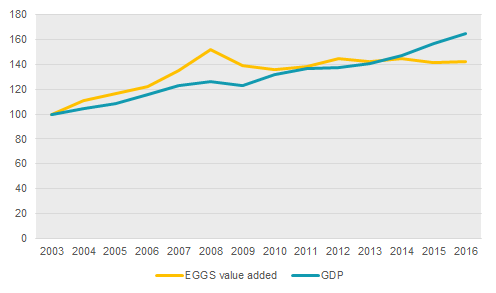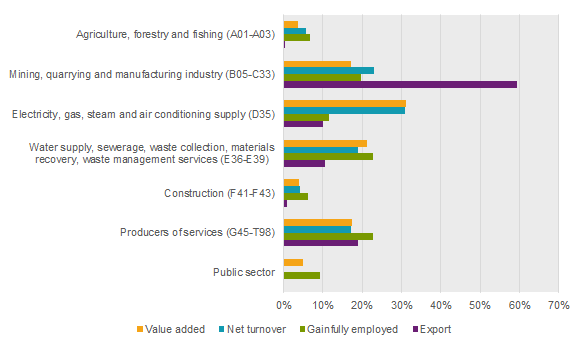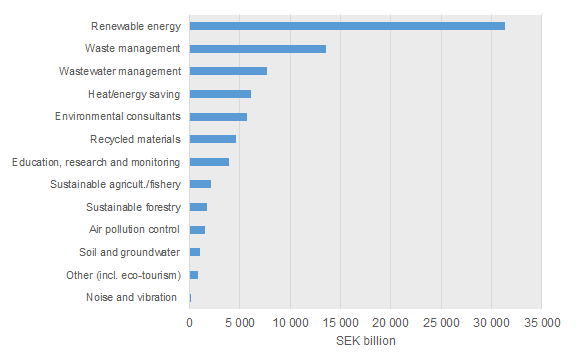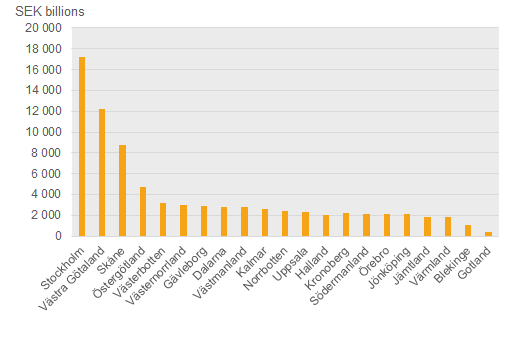Environmental Goods and Services Sector (EGSS) 2016:
Environmental goods and services sector share of GDP decreasing
Statistical news from Statistics Sweden 2018-06-26 9.30
In 2016, environmental goods and services sector (EGSS) value added amounted to SEK 81 billion, which corresponds to almost 2 percent of GDP. Producers of renewable energy, companies in waste collection and sewerage are the economic activities that contributed most to value added in 2016. Since 2008, the EGSS share of GDP has decreased.
The EGSS accounts comprise the production of goods and services for environmental protection and resource management. The aim of these statistics is to describe national economy production activities that generate environmental products. From 2018, EGSS statistics is updated and now also presents value added, output and net turnover.
Decreasing trend since 2008
EGSS value added is estimated to SEK 81 billion in 2016, which corresponds to almost 2 percent of GDP. EGSS value added increased until 2008, when it reached SEK 86 billion, but decreased in 2009 in the wake of the financial crisis. After 2009, EGSS value added has only increased marginally, while GDP has increased at a faster rate. As a result, the EGSS as a share of GDP has had a decreasing trend since 2008. The EGSS decrease since 2008 is mainly due to decreased value added in renewable energy production and the manufacturing industry. Value added in the service sector has instead increased since 2008.

EGSS net turnover amounted to SEK 204 billion in 2016, which corresponds to 2.5 percent of total net turnover from Swedish enterprises. EGSS value added and net turnover have followed similar trends. EGSS turnover peaked in 2008 at SEK 227 billion, but has since then had a decreasing trend.
EGSS mainly consists of enterprises in energy, waste and sewerage
Producers of renewable energy, companies in waste collection and sewerage are the economic activities that contributed most to value added in 2016. Various services, such as environmental consultants and some manufacturing industries – producers of environmental technology, also make up large shares of the EGSS.
With regard to net turnover, renewable energy producers account for the largest share, followed by the manufacturing industry. Gainfully employed persons in the EGSS are mainly found in the service sector and waste collection, closely followed by the manufacturing industry. The statistics also include data on EGSS export of goods and services. EGSS export is dominated by goods and services in the manufacturing industry.

*Households’ non-profit institutions are excluded from the figure. **Value added figures for 2016 are preliminary.
EGSS by environmental area
EGSS statistics can also be broken down by environmental area. These areas describe the type of environmental activity that the enterprises conduct, such as sewerage or environmental consulting. This categorisation is not the same as economic activity. As when data is broken down by economy activity, renewable energy, waste collection and sewerage dominate EGSS value added.

EGSS by county
The data can also be broken down by county, based on the location of the enterprises’ local units. There is a clear dominance in Stockholm, Västra Götaland and Skåne counties, where EGSS value added is highest. These regions also have the largest population. Värmland, Blekinge and Gotland counties account for the lowest EGSS value added.

Updated statistics from 2018
EGSS data is available from 2003. EGSS statistics comprise production of goods and services for environmental protection and resource management. From 2018, the statistics are updated to enable inclusion of new variables, such as value added, output and net turnover, in line with international guidelines. The data is now also presented on a more detailed level, which makes it easier to put in an economic context and allows for more comparable analyses. EGSS statistics are presented based on economic activity, environmental area and geographical distribution.
Definitions and explanations
The environmental accounts are compiled within the framework of the System of Environmental and Economics (SEEA) and present national environmental statistics and economic statistics in the same framework, using NACE industry classification. Environmentally-related statistics connected to the system of national accounts enable an analysis of the connection between the economy and the environment.
EGSS is one part of the environmental accounts and is, since 2017, mandatory for EU Member States to yearly report to Eurostat, in accordance with Regulation (EU) No 691/2011 of the European Parliament and of the Council of 6 July 2011 on European environmental economic accounts. Statistics Sweden published EGSS statistics before this regulation and data is available from 2003. From the current publication, EGSS statistics have been updated to better follow new international guidelines and to be better integrated with the National Accounts. This also enables more detailed analyses and better international comparisons, for example regarding EGSS contribution to the Swedish economy. In addition to National Accounts, data sources include Structural Business Statistics, to describe net turnover, and Labour statistics, based on administrative sources (RAMS) on gainfully employed persons. Previously published EGSS statistics have been revised and the whole time series has been updated.
EGSS statistics are based on a micro-database on enterprises and local units that produce environmental goods and services. Data collection follows Eurostat’s EGSS Handbook, which contains definitions on which economic activities should be defined as environmental activities. Production of renewable energy, waste collection and organic agriculture activities are examples of such economic activities. Activities that are not defined as environmental include wholesale of waste, nuclear energy, and public transport.
For more information about definitions and delimitations, see Eurostat’s handbook:
Environmental goods and services sector accounts – Handbook 2016 edition
Next publishing will be
The next publication of EGSS accounts, with 2017 data, will be in 2019
Statistical Database
More information is available in the Statistical Database
Feel free to use the facts from this statistical news but remember to state Source: Statistics Sweden.
